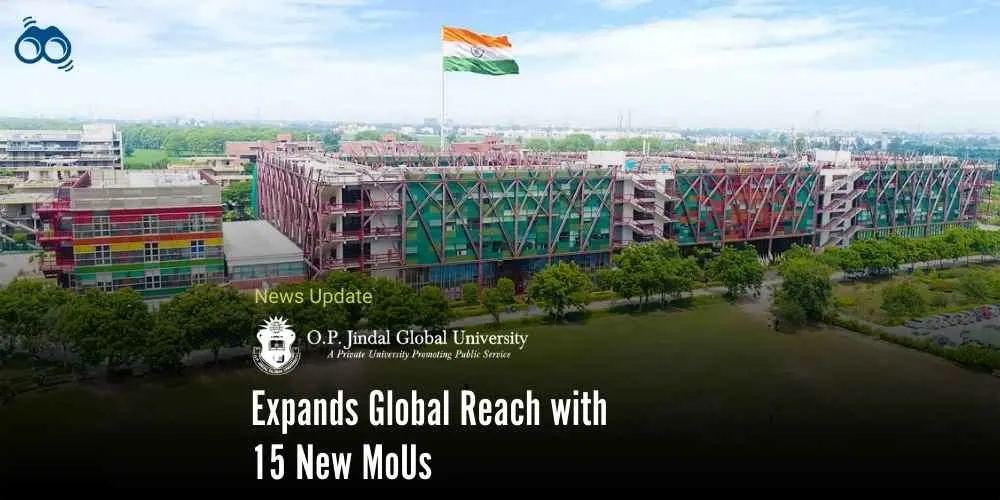JGU Strengthens Global University Status Through Outcome-Driven Agreements with 15 Institutions Worldwide
O.P. Jindal Global University Deepens Internationalisation with Dual Degrees and Faculty Collaborations
O.P. Jindal Global University (JGU), India’s most globally connected university, has announced the formalisation of 15 new Memoranda of Understanding (MoUs) and strategic agreements this summer with leading institutions across ten countries and four continents. These developments mark a significant leap in the university’s commitment to internationalisation, embedding global exposure and academic mobility into the core of university life. Among the most transformative initiatives are the launch of Dual Degree Programmes with the University of Geneva and the University of Melbourne. These programmes allow JGU students to complete part of their studies in India and part abroad, ultimately graduating with two internationally recognised degrees. This model offers students the opportunity to earn global credentials at a fraction of the cost of studying entirely overseas, while unlocking access to postgraduate pathways and career opportunities across international markets.
JGU has also introduced Student Exchange Programmes with institutions such as the University of Rochester, UMass Boston, Masaryk University, Hertie School, ESSEC Business School, and De La Salle University. These semester-long exchanges combine academic learning with cultural immersion, allowing students to engage with diverse pedagogies, interact with international cohorts, and build global networks, all while remaining aligned with their home degree requirements. In parallel, JGU has initiated Faculty and Research Collaborations with institutions including FDC Business School, Rome Business School, Seton Hall University, Brandeis University, University of Michigan, Royal Holloway University of London, and Josai International University. These partnerships promote joint teaching, visiting professorships, collaborative research, and curriculum enrichment, enhancing classroom learning and fostering cross-border knowledge-sharing.
The university’s Office of International Affairs and Global Initiatives (IAGI) has played a pivotal role in advancing these efforts. By cultivating strategic alliances, enabling academic mobility, and linking India more closely with global higher education, IAGI ensures that international opportunities become a standard feature of university life, not a privilege reserved for a few. Professor (Dr.) C. Raj Kumar, Founding Vice-Chancellor of JGU, emphasised that each MoU represented more than a formal agreement. He noted that such initiatives advanced the university’s mission of building India’s first truly global university. According to him, the agreements served as practical frameworks for value creation through dual degrees, semester exchanges, and collaborative research, thereby expanding opportunities for students and faculty in ways that were structured, affordable, and impactful.
Similarly, Professor (Dr.) Akhil Bhardwaj, Vice-Dean and Director of IAGI, remarked that every partnership was approached with a strong focus on outcomes. He explained that the university practised academic diplomacy to ensure that the agreements translated into real experiences, whether through students spending a semester abroad, faculty taking part in joint teaching, or research projects reaching international platforms. Observers note that these collaborations reflect JGU’s vision of democratising education by placing global exposure, diverse learning, and collaborative research at the heart of its academic mission. By embedding internationalisation into every student’s academic journey, JGU is advancing knowledge equity and preparing graduates to engage with the world as informed and responsible global citizens.
With over 550 international partnerships, JGU continues to redefine what it means to be a global university in India, one that is inclusive, forward-looking, and committed to outcome-driven international education.
Editor’s Note
In the contemporary world, global engagement is no longer optional but essential. O.P. Jindal Global University's new international partnerships represent a significant stride in enhancing access to global education. The university's recent expansion, encompassing dual degree programs, student exchanges, and faculty collaborations, signifies a clear shift from merely symbolic internationalisation efforts to practical, results-driven academic initiatives. The most striking aspect of these agreements is their extensive scope and deep connection to the university's core mission. JGU is committed to making global exposure an integral part of every student's academic experience. By offering affordable opportunities and structured programs with tangible impact, the university is modelling how Indian institutions can integrate international mobility into their primary educational frameworks.
This advancement sparks a wider conversation about the evolving position of Indian universities within the global knowledge framework. As higher education grows increasingly international and interconnected, these initiatives provide a clear blueprint for others to emulate, demonstrating how internationalisation can be inclusive, practical, and sustainable. Crucially, they underscore the importance of prioritising equity, relevance, and enduring value for both students and faculty.
Skoobuzz highlights that JGU’s approach reinforces the idea that meaningful global engagement is not only about creating opportunities but also about shaping a more equitable and future-ready higher education landscape.














0 Comments (Please Login To Continue)